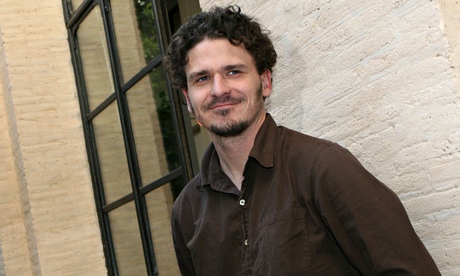
Dave Eggers is a one-man essay in the value and virtue of a life in writing in the 21st century. This is his third published novel in three years. And yet his work never drops below a certain standard and the dude just keeps it coming.
This is the story of a "methodical and non-violent" guy called Thomas, who is seeking the answers to some big questions in his life. In order to facilitate these enquiries, he chloroforms personally significant people from the local town, kidnaps them and then chains them to posts inside separate rooms in a vast disused military base overlooking the Pacific Ocean. As further questions arise and as the story expands, so too does the need for new captives. Thomas is able rigorously to insist (with the threat of his Taser where necessary) that his prisoners tell him the truth. And so one "deposition" leads into another until Thomas starts to feel that things "are really clarifying" for him. Then he meets a girl.
Interestingly, the novel consists solely of the interviews that Thomas conducts and is therefore written only in dialogue. Every scene is set inside the base and we can glean nothing of the wider story except that which comes to us naturally through what is said in these duologues. We gradually realise that this story concerns the police killing of a half-Vietnamese boy, Don Bahn, Thomas's best childhood friend. Meanwhile, the wider thematic concern of the novel is plangently evident from the implications of the title, which is a quotation from the Book of Zechariah in the Old Testament, but which can be read as Eggers's macro-inquisitorial lament for what he perceives to be the decline in American purpose, direction, backbone; the disappearance of the American dream. As Thomas puts it: "Don't we deserve grand human projects that give us some meaning?"
A novel written only in dialogue throws up some unique technical challenges. Most of all, the characters have to be rendered convincingly and distinctively using only voice. This is not easy, given the tendency toward simpler phrasing that contemporary natural-looking speech requires. In film and television, a half-decent actor will disguise weaknesses in the script-writing, but in a dialogue-only novel, there is nowhere to go. And yet Eggers manages this with considerable skill. We come to know who is talking simply through the cadence and idiosyncrasies of their diction. No mean feat.
The other big challenge Eggers has set himself here is to manage the character of Thomas so that he walks the tightrope between truth seeker and psycho; if he falls one way and is too sane, the novel fails because we don't believe he would actually kidnap these people; if he falls the other and is too crazy, then we don't believe that Thomas's pursuit of answers has any resonance wider than that of his own mini-manias. Again, for the most part, Eggers manages the balance well.
If I have a misgiving, it is that there's a streak of wilful naivety in Eggers's work that is often attractive and, yes, heartfelt but that can occasionally shade into facetiousness. Certainly, this novel feels at its weakest in the gestural generalities of the sections about Nasa and war veterans, where Thomas is somewhat glibly questioning an astronaut and a congressman about government budgets and the end of the shuttle programme. Conversely, the book feels at its strongest in the interrogations with an ex-teacher and Thomas's mother. Here, the specificity, nuance and exactitude of the exchanges is engaging and surprising, and the writing loses its sense of having been staged for the purposes of idea transmission. Instead, Eggers inhabits his characters so fully that he himself disappears and we believe completely in the inter-relationships in front of us.
That said, there are some interesting recapitulations of big contemporary ideas in this book: the power of narrative and how "every story ends with the firing of a gun"; the madness of the "strange race" of American people – "no one else expects to get their way like we do"; the "connection" of killing; the alienation of bureaucracy. And it's indicative that I found the writing even more interesting as I went through it a second time harvesting my notes. I'm not sure Your Fathers is quite the testament it hopes to be but – paradoxically – it's an Eggers I would definitely recommend to those who haven't yet read him.

